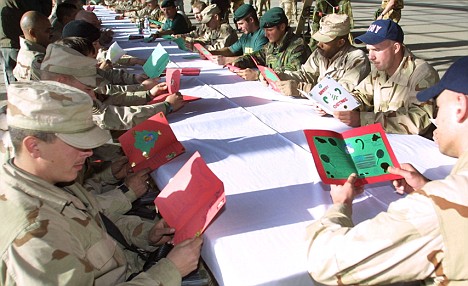HOLIDAY MAIL GUIDELINES
Before sending seasonal mail, please review our holiday guidelines. Specific dates, themes, or messages may affect when and where letters can be shared.
We see a higher concentration of mail during certain holidays, but we aim to distribute letters all year long.
After the postmark deadline please keep messages holiday neutral. Decorating your letters in holiday colors or holiday stationary is fine as long as the message is neutral.

HOLIDAY-THEMED MAIL DEADLINES
If you’d like to send holiday-themed mail, please follow the deadlines below to ensure it arrives on time.
VALENTINE’S DAY • FEBRUARY 14
Active Duty or Veterans • Kindness, care, encouragement
POSTMARK BY JANUARY 31
If you’re writing to someone currently serving, use “Dear Service Member.” For those no longer in uniform, address your letter to “Dear Veteran.” Valentine’s Day is a chance to share appreciation and kindness—not romantic gestures. Keep your message warm, supportive, and focused on reminding them they are appreciated, remembered, and valued.
ARMED FORCES DAY • MAY 16
Active Duty Only • Respect and recognition
POSTMARK BY MAY 2
Armed Forces Day honors those actively serving in the U.S. military across all branches. These are the men and women currently carrying out missions at home and abroad. Use “Dear Service Member” to recognize their sacrifice and daily commitment. Your letter should reflect respect, strength, and support—avoiding holiday cheer or general sentiments.
MEMORIAL DAY • LAST MONDAY IN MAY
Active Duty or Veterans • Day of Remembrance
POSTMARK BY MAY 11
When writing, please do not say “Happy Memorial Day” in your letters. This is a solemn time to honor those who have died while serving.
INDEPENDENCE DAY • JULY 4
Active Duty or Veterans • Patriotism and freedom
POSTMARK BY JUNE 15
Use “Dear Service Member” for active duty or “Dear Veteran” for former military. Highlight appreciation for their role in protecting liberty. Stay away from clichés or political themes; instead, share genuine gratitude for their part in preserving our freedoms. Uplifting, patriotic language is welcome when used respectfully.
NATIONAL DAY OF THE DEPLOYED • OCTOBER 26
Active Duty Only • Support from home
POSTMARK BY OCTOBER 12
Use “Dear Service Member” for anyone currently deployed. This day recognizes the sacrifice of those serving away from home and the families they leave behind. Your letter should express appreciation for their courage, resilience, and ongoing mission. Keep your message grounded in support, encouragement, and pride—avoiding political commentary or holiday-style greetings.
VETERANS DAY • NOVEMBER 11
Veterans Only • Respect and recognition
POSTMARK BY OCTOBER 31
Veterans Day honors all who no longer serve in the U.S. Armed Forces—past, not present. It’s a time to recognize their service, sacrifices, and continued impact. Use “Dear Veteran” to address your letter.
THANKSGIVING • NOVEMBER 26
Active Duty or Veterans • Gratitude and reflection
POSTMARK BY NOVEMBER 12
Use “Dear Service Member” or “Dear Veteran” depending on the recipient. Share what you’re thankful for and how their service has touched your life. Simple, heartfelt thanks are always appreciated.
CHRISTMAS / HOLIDAY SEASON • MONTH OF DECEMBER
Active Duty or Veterans • Hope and encouragement
POSTMARK BY DECEMBER 11
Use “Dear Service Member” for those currently serving or “Dear Veteran” for those who have served. Share winter-themed encouragement and support without naming specific holidays like Christmas, Hanukkah, or Kwanzaa. We do not know the religious preference of the recipient or what holidays they celebrate. Instead, focus on warmth, appreciation, and kindness.
Your support and patriotism has helped strengthen the resolve of our Marines. It’s people like you that keep the Marines motivated and proud to serve our country. Please know that your support has significantly raised the morale of our Marines.
